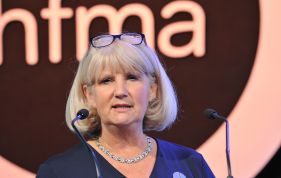Comment / HFMA 2018: credible solution needed to workforce challenge
Money remains incredibly tight – even with the additional £20bn real-terms increase over the next five years announced in the summer and confirmed in October’s Budget. Anita Charlesworth (pictured), director of research and economics at The Health Foundation, reminded everyone exactly how tight. The 3.4% a year average growth above inflation is below the long-term average of 3.7%. ‘So while it is a substantial improvement on what we have seen over the last eight years, we do need to be very realistic about what can be achieved,’ she said.
The new money had to be seen in the context of the pressures facing the service. We were no longer just talking about future demographic changes – the service was already experiencing them. There will be 1.1 million more over 65s in the next five years all typically using three times as much healthcare as younger adults and multiple health conditions are increasingly becoming the norm among the frail elderly.
But beyond this basic financial challenge, there is a more fundamental challenge – the NHS and social care workforce. The currently 100,000 NHS vacancies could grow to as much as 250,000 or even 350,000 by 2030 according to recent estimates from the foundation working with The King’s Fund and the Nuffield Trust.
Speaking later as part of a panel session, Ms Charlesworth said that the service had drawn heavily on staff good will in recent years and the plan now needed to give staff a sense of hope, end the ‘crisis narrative’ and be credible, rather than deliver a ‘wish list disconnected from reality’. 
Rebecca Rosen (pictured right), GP and senior fellow at the Nuffield Trust, argued that a new workforce strategy had to be about more than just numbers of staff – although increases were clearly needed. She said new roles and new ways of working, including use of technology, would also be vital to meeting patient demand. Again stressing the need for credibility, the plan needed to be realistic about the time needed to make these changes, she added.
NHS Improvement chief executive Ian Dalton (pictured) said that workforce was one of three important elements in the forthcoming NHS plan, alongside the financial architecture and working across systems. Recruitment and retention would both be addressed. Mr Dalton said the NHS needed to do ‘an awful lot of work’ to ensure it had the staff to deliver services to patients. As well as retaining current staff and training new workers, an international recruitment at scale would be needed.
Health Education England’s director of workforce planning Rob Smith said that, while he couldn’t talk about the specific contents of the long-term plan, it would build on last year’s workforce strategy. In particular, it would take forward the six principles identified in the strategy:
1) Securing the supply of staff
2) Enabling a flexible and adaptable workforce through investment in education and training
3) Providing broad pathway for careers in the NHS
4) Ensuring people from al backgrounds have the opportunity to contribute
5) Ensuring the NHS is an inclusive modern model employer
6) Ensuring service, financial and workforce planning are intertwined.
Issues about training, attracting staff back and retaining staff would all need to be addressed. The plan would have two time horizons. The next few years, before significant new numbers could be trained, would rely on tactical options – including, international recruitment, retention and return to work. For the years beyond 2023/24 the plan would need to make commitments about how supply would be grown.
Looking specifically at the NHS finance function, the conference also addressed the need for much greater diversity in its senior leadership. In a panel discussion, three chief finance officers spoke about their experiences as well as Going beyond – the NHS Improvement programme they are developing.
Women and those from black and minority ethnic groups make up significant proportions of the NHS finance workforce but they are not well represented in senior finance jobs (see Financial equals, Healthcare Finance, December 2018). ‘We have the workforce, with real diversity, but we are not pushing or pulling them up. Sponsorship will be part of pulling them up, but we also want individuals to come forward,’ Sandra Easton (pictured far right), chief finance officer of Chelsea and Westminster NHS Foundation Trust, told the conference.

New HFMA president Bill Gregory (pictured), who unveiled Value the opportunity as his theme for his year in office, said he was also keen to hear the views of younger members of the NHS finance profession. ‘It is also a truism that the future leadership of the profession are our younger members,’ he said. ‘When I visit the branches during my year I would welcome opportunities to hear what our future leaders are thinking to help inform how the HFMA develops in the future.’
 The conference also discussed the need to invest in mental health services – already identified as a priority for the long-term plan. Claire Murdoch (pictured), Central and North West London NHS Foundation Trust chief executive and NHS England national mental health director, insisted that investment was particularly needed in out-of-hospital mental health services to further move away from institutional care for many patients. More 24/7 intensive home care and treatment services were needed to avoid being stuck in a ‘cycle of not having enough acute beds’, she said.
The conference also discussed the need to invest in mental health services – already identified as a priority for the long-term plan. Claire Murdoch (pictured), Central and North West London NHS Foundation Trust chief executive and NHS England national mental health director, insisted that investment was particularly needed in out-of-hospital mental health services to further move away from institutional care for many patients. More 24/7 intensive home care and treatment services were needed to avoid being stuck in a ‘cycle of not having enough acute beds’, she said.

He said that in addition to good outcomes for individuals, the approach consistently reduced the use of hospital and general practice by 20%. Uptake is increasing with 12 clinical commissioning groups already adopting the practice ‘universally’ and there is a national policy commitment for all patients to be able to access social prescription by 2023.
While the Brexit chaos continues to distract the country and dominate the media, everyone working in the NHS recognises the NHS long-term plan will have a significant impact on the delivery of health services for the next generation. The over-riding theme emerging from the conference is that the long-term plan must address many issues – with workforce being, perhaps, the greatest challenge. And it must ensure that changes made in one area (or budget) don’t inhibit plans elsewhere. Fundamentally it needs to be credible and the staff that are key to its success need to believe that it really is deliverable.
Related content
The Institute’s annual costing conference provides the NHS with the latest developments and guidance in NHS costing.
The value masterclass shares examples of organisations and systems that have pursued a value-driven approach and the results they have achieved.